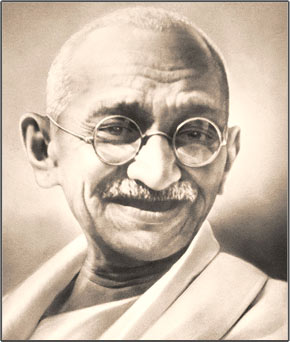Pacifism may be perfectly reasonable when the stakes are low, but in the end pacifism is merely a willingness to die, and to let others die, at the hands of the world's murderers. It is significant to note that a madman, armed only with a knife, could exterminate an entire city of pacifists. It is clear in this context that violence is a requisite for the maintenance of civil society. This may seem paradoxical, but I assure you it isn't. All it takes to recognize this is a willingness to admit that there are bound to be people in our world who are simply beyond the sort of non-violent methods we may use to prevent them from causing suffering. As the author Sam Harris puts it: "When your enemy has no scruples, your own scruples become another weapon in his hand."
 When the stakes are high, pacifism can be highlighted even brighter for its shortcomings. Gandhi was known to say that the Jews should have committed mass suicide as a remedy for the Holocaust, because it would have drawn attention around the world to Hitler's violence. The obvious question here is: what would a world full of pacifists have done once its attention had been raised? This question brings to light another shortcoming of pacifism, in that in many cases it requires for its maintenance the presence of people who are willing to use violence. We may wonder where a pacifist position would leave Middle Eastern Jews in their conflict with the Muslim world, given the murderous rage a significant number of Muslims feel at the presence of infidels in "their" holy land. It would leave them either at the mercy of the West for their protection, or at the mercy of the Muslim world to suddenly realize that killing in the name of Allah isn't really a moral precept.
When the stakes are high, pacifism can be highlighted even brighter for its shortcomings. Gandhi was known to say that the Jews should have committed mass suicide as a remedy for the Holocaust, because it would have drawn attention around the world to Hitler's violence. The obvious question here is: what would a world full of pacifists have done once its attention had been raised? This question brings to light another shortcoming of pacifism, in that in many cases it requires for its maintenance the presence of people who are willing to use violence. We may wonder where a pacifist position would leave Middle Eastern Jews in their conflict with the Muslim world, given the murderous rage a significant number of Muslims feel at the presence of infidels in "their" holy land. It would leave them either at the mercy of the West for their protection, or at the mercy of the Muslim world to suddenly realize that killing in the name of Allah isn't really a moral precept. Needless to say, if these are the choices pacifism offers, Israel has done well to throw it on the philosophical trash heap. A worldview that in itself is not self-sustaining should be a red flag to us. Especially given the world in which we live in, where the push of a button can cause the abject suffering and death of thousands. When nuclear and biological weapons are factored into our ethical equations, pacifism simply ceases to be a possible solution.
To digress for a moment, even if pacifism were somehow worthy of the status it has gained in our discourse, it would still not lend merit to the idea that it is beyond criticism. To put it plainly, nothing should be beyond criticism, if only for the reason that any belief worth subscribing to should be able to stand up to conversational analysis. Pacifism has been branded with a rectitude seemingly so impenetrable, that it remains largely unassailed as an ethical tenet. I invite you all to join me in pulling it down out of the clouds of false righteousness.
To digress for a moment, even if pacifism were somehow worthy of the status it has gained in our discourse, it would still not lend merit to the idea that it is beyond criticism. To put it plainly, nothing should be beyond criticism, if only for the reason that any belief worth subscribing to should be able to stand up to conversational analysis. Pacifism has been branded with a rectitude seemingly so impenetrable, that it remains largely unassailed as an ethical tenet. I invite you all to join me in pulling it down out of the clouds of false righteousness.


